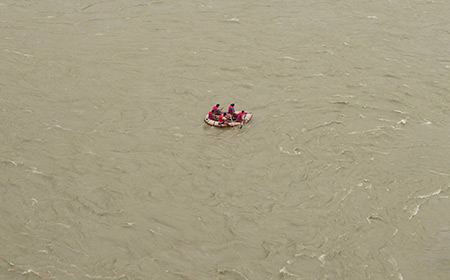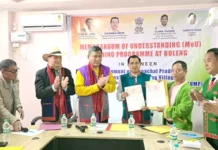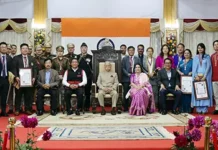[ Kime Rambia ]
The Pakke Tiger Reserve (PTR) is an 861.95 sq km landscape, and our team manages the Tippi wildlife range, the western side of Pakke, bounded by the mighty Kameng river.
Often, miscreants do cross the river at night and put up traps and snares, targeting birds like pheasants, jungle fowls, and mammals from small rodents to deer. We regularly patrol the river and check vulnerable locations, using an inflatable boat.
There was one river patrol on 12 September, 2016, which we will remember for a long, long time.
My team had Suren Das, the most experienced boatman in Pakke, who has been working here for the last 20 years. We also had three regular members of the patrolling team (driver Legrong Tulang, along with Wangta Ralongham and Rakesh Nabum of the Special Tiger Protection Force), plus Tenzing Norbu Thongdok, an excited young forester who had just joined the department.
Due to the monsoon rains, the river looked much bigger and threatening that day, but I was confident that my team would be able to comfortably navigate the downstream current and carry out checking at suspected locations. Also, the fact that we had been doing this regularly for a number of times made us self assured.
So we set off, despite the river looking enormously larger. I ensured that each member had put on their lifejacket and fastened the belt.
We started from a point called Pinjuli, about 10-11 kms upstream of Bhalukpong. But a few hundred metres downstream, our raft got trapped in a series of unusually high rapids – it stood vertically in the first rapid – but we managed to keep the balance. The second one was the highest we ever saw here; it tossed our raft upside down like a matchbox, and the very next moment, all of us were thrown into the flooding river – dumped under the raft, entangled with rope, rudders, and a few bags containing drinking water, notebook, GPS, etc.
Our struggle to get out of it, coupled with breathlessness underwater, tired us immediately. We managed to get out somehow, and I advised everyone to swim towards the bank by holding onto the raft with one hand as it helped us remain afloat. It is very easy to offer advice but immensely difficult to apply it when flooding river rapids are splashing on your face and tossing you up and down like a tennis ball. I had never felt so insignificant. Every time we neared the safety of the riverbank, a sudden gush of waves swept us back to the middle of the river. Multiple failed attempts to reach the bank, and disappointment, drenched the last of our strength. My arms felt like they were about to break off, and a few of us started swallowing water.
But we still had our lifejackets on, and we were still holding onto the raft. I thought even if we didn’t reach the bank, if we remained afloat for another 9-10 kilometres downstream, we would reach the plains of Assam, where the flow is milder.
But we soon realized that we were just five of us. Tenzing was nowhere to be seen. As we looked around for him, while we too were precariously dangling from the raft, many thoughts passed my mind: We had lost Tenzing and I would be unable to face his mother. What if any of my boys drowned? I was their team leader.
Then we saw Tenzing, who was 60-70 metres downstream from us. He was shocked, petrified, and not even trying to come out and swiftly being swept away from us. Though his lifejacket was keeping him afloat and did not allow him to drown, he needed to put effort and swim towards the bank. But with every passing moment he was being swept further away from us.
We kept screaming to him, and finally managed to get his attention. When he saw that we, too, were struggling, he was reassured and started swimming towards the riverbank. The five of us, too, gathered all our strength and pushed ourselves towards the bank in a synchronized effort, holding onto the raft. I can’t remember how long it took, how much water we swallowed, how much distance we were swept away downstream; but all six of us reached the riverbank.
We had lost a few rudders, cellphones, shoes and bags, and damaged our sets of walkie-talkies and GPS, but all six of us were safe, with our feet on land. We did not celebrate or hug but just sat there stunned, speechless, relieved and wondering about what just happened.
After some time, we gathered ourselves, climbed up to the highway, and relayed a message to the range headquarters for a vehicle. We piled up our things and drove back, thanking god and our lifejackets. We had found a new respect for lifejackets and understood why it is called a ‘lifejacket’.
Tenzing is currently posted in Itanagar, and is all hale and hearty – and yes, the rest of us, along with my other staff, still continue our river patrolling regularly.
In Pakke, many frontline staffers have lost their lives in the line of duty, mostly to wild elephants, a few others to drowning, tiger attacks, and poachers, compelling one of our deputy rangers to say, “Pakke mein sablog ek lottery jese hai; kab kiska lagega pata nahi (In Pakke, everybody lives on a lottery; you never know whose number will come next).”
But luck was definitely on our side that day. (The contributor is Range Forest Officer in the Tippi wildlife range of the PTR)




